Rabbi Stern began the Mishnah on דף ט עמוּד ב before פּסח, but for the sake of review as well as continuity we will address it today. Our theme from the previous Blog Yomi was מִדָה כְּנֶגֶד מִדָה, or measure for measure, and the Mishnah points out other examples of people who were treated by הקבּ״ה commensurate with their actions. I would daresay that this Mishnah is among the longest that exist in the Talmud.
שִׁמְשׁוֹן הָלַךְ אַחַר עֵינָיו — לְפִיכָךְ נִקְּרוּ פְּלִשְׁתִּים אֶת עֵינָיו, שֶׁנֶּאֱמַר: ״וַיֹּאחֲזוּהוּ פְלִשְׁתִּים וַיְנַקְּרוּ אֶת עֵינָיו״.
שִׁמְשׁוֹן followed his eyes, therefore he was punished measure for measure, as the Philistines gouged out his eyes, as it is stated: “And the Philistines laid hold on him, and put out his eyes” (וַיֹּאחֲז֣וּהוּ פְלִשְׁתִּ֔ים וַֽיְנַקְּר֖וּ אֶת־עֵינָ֑יו).

John Milton’s play Samson Agonistes, based in part on the פְּסוּקִים in שׁוֹפְטִים detailing the downfall of שִׁמְשׁוֹן, begins with the hero, “the great deliverer” Samson, blinded and in exile in Gaza, his dalliance with Delilah over, his famous strength lost. Samson is both literally and metaphorically blind:
Thou art become (O worst imprisonment!)
The Dungeon of thy self; thy soul
(Which men enjoying sight oft without cause complain)
Imprisoned now indeed,
In real darkness of the body dwells,
Shut up from outward light
To incorporate with gloomy night
For inward light alas
Puts forth no visual beam.
To paraphrase Roger Cohen, the מִדָה כְּנֶגֶד מִדָה for שִׁמְשׁוֹן is that he was a victim of a lack of moral clarity that stemmed from a fog of his own making. Rabbi Stern refers to שִׁמְשׁוֹן as an enigma. In his erudition, Rabbi Normal Lamm ע״ה referred to Samson more bluntly as a pathetic figure, upon which the Gemara will elaborate.
The Mishnah continues:
אַבְשָׁלוֹם נִתְגָּאָה בִּשְׂעָרוֹ — לְפִיכָךְ נִתְלָה בִּשְׂעָרוֹ. וּלְפִי שֶׁבָּא עַל עֶשֶׂר פִּלַגְשֵׁי אָבִיו — לְפִיכָךְ נִתְּנוּ בּוֹ עֶשֶׂר לוֹנְבִיּוֹת, שֶׁנֶּאֱמַר: ״וַיָּסֹבּוּ עֲשָׂרָה אֲנָשִׁים נוֹשְׂאֵי כְּלֵי יוֹאָב״. וּלְפִי שֶׁגָּנַב שָׁלֹשׁ גְּנֵבוֹת: לֵב אָבִיו, וְלֵב בֵּית דִּין, וְלֵב יִשְׂרָאֵל, שֶׁנֶּאֱמַר: ״וַיְגַנֵּב אַבְשָׁלוֹם אֶת לֵב אַנְשֵׁי יִשְׂרָאֵל״ — לְפִיכָךְ נִתְקְעוּ בּוֹ שְׁלֹשָׁה שְׁבָטִים, שֶׁנֶּאֱמַר: ״וַיִּקַּח שְׁלֹשָׁה שְׁבָטִים בְּכַפּוֹ וַיִּתְקָעֵם בְּלֵב אַבְשָׁלוֹם״.
אַבְשָׁלוֹם was excessively proud of his hair, and therefore he was hanged by his hair. And furthermore, because he engaged in sexual intercourse with ten of his father’s concubines [see II Samuel 15:16 (וַיֵּצֵ֥א הַמֶּ֛לֶךְ וְכל־בֵּית֖וֹ בְּרַגְלָ֑יו וַיַּעֲזֹ֣ב הַמֶּ֗לֶךְ אֵ֣ת עֶ֧שֶׂר נָשִׁ֛ים פִּֽלַגְשִׁ֖ים לִשְׁמֹ֥ר הַבָּֽיִת) and 16:22 (וַיַּטּ֧וּ לְאַבְשָׁל֛וֹם הָאֹ֖הֶל עַל־הַגָּ֑ג וַיָּבֹ֤א אַבְשָׁלוֹם֙ אֶל־פִּֽלַגְשֵׁ֣י אָבִ֔יו לְעֵינֵ֖י כל־יִשְׂרָאֵֽל)].
Therefore ten spears [לוֹנְבִיּוֹת] were put, i.e., thrust, into him, as it is stated: “And ten young men that bore יוֹאָב’s armor encircled אַבְשָׁלוֹם, and killed him” (וַיָּסֹ֙בּוּ֙ עֲשָׂרָ֣ה נְעָרִ֔ים נֹשְׂאֵ֖י כְּלֵ֣י יוֹאָ֑ב וַיַּכּ֥וּ אֶת־אַבְשָׁל֖וֹם וַיְמִתֻֽהוּ – II Samuel 18:15). And because he stole three times, committing three thefts of people’s hearts: The heart of his father, as he tricked him by saying that he was going to sacrifice offerings; the heart of the court, as he tricked them into following him; and the heart of the Jewish people, as it is stated: “So Absalom stole the hearts of the men of Israel” (וַיַּ֨עַשׂ אַבְשָׁל֜וֹם כַּדָּבָ֤ר הַזֶּה֙ לְכל־יִשְׂרָאֵ֔ל אֲשֶׁר־יָבֹ֥אוּ לַמִּשְׁפָּ֖ט אֶל־הַמֶּ֑לֶךְ וַיְגַנֵּב֙ אַבְשָׁל֔וֹם אֶת־לֵ֖ב אַנְשֵׁ֥י יִשְׂרָאֵֽל – II Samuel 15:6), therefore three spears were embedded into his heart, as it is stated: “Then said יוֹאָב: I may not tarry like this with you. And he took three spears in his hand, and thrust them through the heart of אַבְשָׁלוֹם, while he was yet alive” (וַיֹּ֣אמֶר יוֹאָ֔ב לֹא־כֵ֖ן אֹחִ֣ילָה לְפָנֶ֑יךָ וַיִּקַּח֩ שְׁלֹשָׁ֨ה שְׁבָטִ֜ים בְּכַפּ֗וֹ וַיִּתְקָעֵם֙ בְּלֵ֣ב אַבְשָׁל֔וֹם עוֹדֶ֥נּוּ חַ֖י בְּלֵ֥ב הָאֵלָֽה – II Samuel 18:14).
The Mishnah continues, this time with regard to the reward for goodness:
וְכֵן לְעִנְיַן הַטּוֹבָה: מִרְיָם הִמְתִּינָה לְמֹשֶׁה שָׁעָה אַחַת, שֶׁנֶּאֱמַר: ״וַתֵּתַצַּב אֲחוֹתוֹ מֵרָחוֹק״ — לְפִיכָךְ נִתְעַכְּבוּ לָהּ יִשְׂרָאֵל שִׁבְעָה יָמִים בַּמִּדְבָּר, שֶׁנֶּאֱמַר: ״וְהָעָם לֹא נָסַע עַד הֵאָסֵף מִרְיָם״.

And the same is so with regard to the reward of good deeds; a person is rewarded measure for measure. Miriam waited for the baby מֹשֶׁה for one hour at the shore of the Nile, as it is stated: “And his sister stood afar off, to know what would be done to him” (וַתֵּתַצַּ֥ב אֲחֹת֖וֹ מֵרָחֹ֑ק לְדֵעָ֕ה מַה־יֵּעָשֶׂ֖ה לֽוֹ – Shemos 2:4). Therefore the Jewish people delayed their travels in the desert for seven days to wait for her when she was smitten with leprosy, as it is stated: “And מִרְיָם was confined outside of the camp seven days; and the people journeyed not until מִרְיָם was brought in again” (וַתִּסָּגֵ֥ר מִרְיָ֛ם מִח֥וּץ לַֽמַּחֲנֶ֖ה שִׁבְעַ֣ת יָמִ֑ים וְהָעָם֙ לֹ֣א נָסַ֔ע עַד־הֵאָסֵ֖ף מִרְיָֽם – Bamidbar 12:15).
The Mishnah continues:
יוֹסֵף זָכָה לִקְבּוֹר אֶת אָבִיו, וְאֵין בְּאֶחָיו גָּדוֹל מִמֶּנּוּ, שֶׁנֶּאֱמַר: ״וַיַּעַל יוֹסֵף לִקְבֹּר אֶת אָבִיו וַיַּעֲלוּ עִמּוֹ גַּם רֶכֶב גַּם פָּרָשִׁים״. מִי לָנוּ גָּדוֹל מִיּוֹסֵף, שֶׁלֹּא נִתְעַסֵּק בּוֹ אֶלָּא מֹשֶׁה.
יוֹסֵף merited to bury his father, resulting in a display of great honor to his father, and there was none among his brothers greater than he in importance, for he was viceroy of Egypt, as it is stated: “And יוֹסֵף went up to bury his father; and with him went up all the servants of Pharaoh, the Elders of his house, and all the Elders of the land of Egypt, and all the house of יוֹסֵף, and his brethren, and his father’s house; only their little ones, and their flocks, and their herds, they left in the land of Goshen. Anboth chariots and horsemendwent up with him ; and it was a very great company” (Genesis 50:7–9). No one had a greater burial than יוֹסֵף, as it was מֹשֶׁה himself who was involved in transporting his coffin.
And the Mishnah concludes:
מֹשֶׁה זָכָה בְּעַצְמוֹת יוֹסֵף, וְאֵין בְּיִשְׂרָאֵל גָּדוֹל מִמֶּנּוּ, שֶׁנֶּאֱמַר: ״וַיִּקַּח מֹשֶׁה אֶת עַצְמוֹת יוֹסֵף עִמּוֹ״ — מִי גָּדוֹל מִמֹּשֶׁה שֶׁלֹּא נִתְעַסֵּק בּוֹ אֶלָּא הַמָּקוֹם, שֶׁנֶּאֱמַר: ״וַיִּקְבֹּר אוֹתוֹ בַּגַּי״. לֹא עַל מֹשֶׁה בִּלְבַד אָמְרוּ, אֶלָּא עַל כל הַצַּדִּיקִים, שֶׁנֶּאֱמַר: ״וְהָלַךְ לְפָנֶיךָ צִדְקֶךָ כְּבוֹד ה׳ יַאַסְפֶךָ״.
מֹשֶׁה merited to be the only person involved in the transportation of Joseph’s bones to be buried in Eretz Yisrael, and there was none among the Jewish people greater than he, as it is stated: “And מֹשֶׁה took the bones of יוֹסֵף with him” (Exodus 13:19). No one had a greater burial than מֹשֶׁה, as הקבּ״ה Himself made the burial arrangements as it is stated: “And He buried him in the valley in the land of Moab over against Beth Peor; and no man knows of his sepulcher unto this day” (Devarim 34:6). The Mishnah comments: Not only with regard to מֹשֶׁה did the Sages say that G-d takes part in his burial, but also with regard to all the righteous individuals, as it is stated: “Your righteousness shall go before you and the glory of the Lord shall gather you in” (Yeshaya 58:8).

The Gemara elaborates on all of the above, but perhaps the most striking message that Rabbi Stern emphasizes, starting at the 6:00 minute mark of his video is that the mythologized imagery of שִׁמְשׁוֹן does not match the reality of the fact that he was disabled most of his life. The Gemara alludes to this in the following passage:
וְאָמַר רַבִּי יוֹחָנָן: בִּלְעָם חִיגֵּר בְּרַגְלוֹ אַחַת הָיָה, שֶׁנֶּאֱמַר ״וַיֵּלֶךְ שֶׁפִי״. שִׁמְשׁוֹן חִיגֵּר בִּשְׁתֵּי רַגְלָיו הָיָה, שֶׁנֶּאֱמַר: ״שְׁפִיפֹן עֲלֵי אֹרַח״.
And רַבִּי יוֹחָנָן says: בִּלְעָם was lame in one of his legs, as it is stated with regard to him: “And he went, limping [shefi]” (Numbers 23:3). שִׁמְשׁוֹן was lame in both of his legs, as it is stated that when יַעַקֹב mentioned the tribe of דָן in the prophecy that pertained to שִׁמְשׁוֹן, he referred to him as: “דָן shall be a serpent in the way, a horned snake [shefifon] in the path” (Genesis 49:17), which is double shefi, i.e., doubly lame.

As Rabbi Stern notes, and Rabbi Lamm elaborates, in reading through שׁוֹפְטִים we can see that most of שִׁמְשׁוֹן’s actions were personal vendettas rather than positive actions on behalf of the Jewish people. It seems fitting that he was characterized by the jawbone of an ass (וַיֹּ֣אמֶר שִׁמְשׁ֔וֹן בִּלְחִ֣י הַחֲמ֔וֹר חֲמ֖וֹר חֲמֹרָתָ֑יִם בִּלְחִ֣י הַחֲמ֔וֹר הִכֵּ֖יתִי אֶ֥לֶף אִֽישׁ – Judges 15:16). Essentially the depiction of שִׁמְשׁוֹן pulling the columns of a Philistine temple inward, killing thousands as the rubble collapsed, was a burst of strength representing the last hurrah of a crestfallen egomaniac.
Continuing in this vein, the Gemara proceeds to cite other tragic events and failed figures, and one of them who Rabbi Stern emphasizes is צִדְקִיָהוּ.
צִדְקִיָּה בְּעֵינָיו, דִּכְתִיב: ״וְאֶת עֵינֵי צִדְקִיָּהוּ עִוֵּר״
The complete pasuk in מְלָכִים בּ reads as follows:
וְאֶת־בְּנֵי֙ צִדְקִיָּ֔הוּ שָׁחֲט֖וּ לְעֵינָ֑יו וְאֶת־עֵינֵ֤י צִדְקִיָּ֙הוּ֙ עִוֵּ֔ר וַיַּאַסְרֵ֙הוּ֙ בַֽנְחֻשְׁתַּ֔יִם וַיְבִאֵ֖הוּ בָּבֶֽל
The last king of the Jewish people before the final exile was צִדְקִיָהוּ. He began his puppet reign as a Babylonian vassal when he was only 21 years old. He was a weak king with limited experience and poor advisors. In fact, his birth name was “מַתַּנְיָה”, and it was Nevuchadnezzar who re-named him צִדְקִיָהוּ to make him appear more trustworthy to the people. But zealous princes in Judah together with other national leaders persuaded him to join forces in rebellion against Nevuchadnezzar, which resulted in the siege of Jerusalem.
As Rabbi Stern reviews, צִדְקִיָהוּ was purported to have excellent eyesight, including above-average night vision. Tellingly, his being blinded after being forced to witness the death of his sons was another example of מִדָה כְּנֶגֶד מִדָה.


fabulous post. The artwork greatly enhances the lessons.
It pleases me to receive that feedback, Dan. In the Preface to the Everyman’s Library collection of Joan Didion’s collected nonfiction pieces, she notes: “I suppose almost everyone who writes is afflicted some of the time by the suspicion that nobody out there is listening”. Thank you for accompanying me on this daily journey, and for paying such close and ongoing attention.
Your scholarship and devotion to your readers are greatly appreciated.